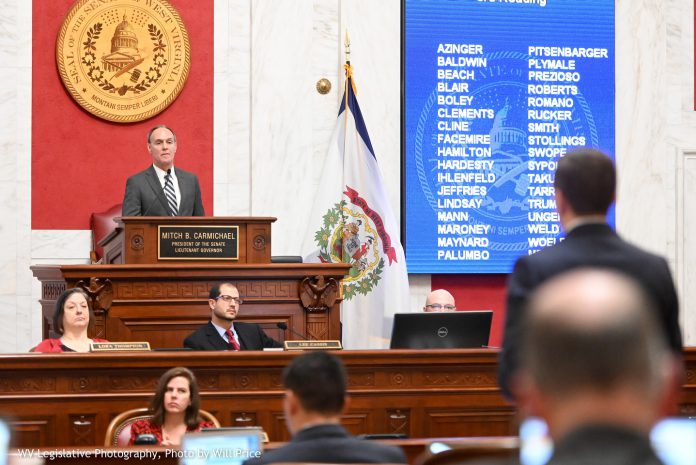The Senate convened at 11 a.m. Monday to discuss the passage of 14 bills, three of which originated in the House of Delegates.
One bill was Senate Bill 275, which would create an Intermediate Court of Appeals. Sen. Charles S. Trump IV, R-Morgan, presented the bill and stated his support. Much debate from the Senate followed.
Several senators rose in opposition to the bill, many expressing that the creation of the Intermediate Court of Appeals was unnecessary, or that other issues should be prioritized and receive more funding in its place.
Sen. Mike Woelfel, D-Cabell, spoke against the bill, stating that this was a misuse of this year’s budget, and was too expensive to consider a priority.
Sen. Mike Romano, D-Harrison, also expressed concerns about the cost of the potential Intermediate Court system, asking the Senate to consider the accumulation of funds that would be directed to this court over the years. Romano also argued that the state Supreme Court of Appeals did not need this addition to the court system, and that there has been at least one instance where an Intermediate Court was deemed unnecessary and removed in one state.
Sen. Ryan Weld, R-Brooke, rose in support of the bill, stating that the expected cost of the Intermediate Court of Appeals was expected to drop significantly in the coming years. He also argued that the Intermediate Court was necessary and would represent a larger population than the Intermediate Courts that have been removed.
Trump closed debate by stating that the Supreme Court of Appeals is busier now than it has ever been. Trump said that the cost of the Intermediate Court of Appeals is reasonable and well worth the results. He said that he believes the Intermediate Courts would ensure that all civic cases are heard, and this would better the justice system in West Virginia.
The bill passed 18-14 and will advance to the House for further consideration.
Three House bills passed the Senate Monday. The Senate requested the House to concur before legislation is completed for these bills.
House Bill 2086 creates the Uniform Real Property Electronic Recording Act. This bill provides that any state law requiring a land document must be satisfied by an electronic form. The bill requires the Real Property Electronic Recording Standards Council create a legislative rule regarding the standards for electronic recording to be used by each county.
House Bill 4007 creates the Born Alive Survivors Protection Act, which requires that a medical professional perform life-saving measures for a child born alive after an abortion is performed.This legislation does not substantially change with current law but ensures that physicians use reasonable medical judgement when a child is born breathing.
House Bill 4058 updates the law concerning pharmacy benefit managers. The bill clarifies licensing requirements, terms and fees for the profession.
Senate bills 96, 195, 266, 573, 576, 600, 665, 670, 676, 678 were all passed today, and will advance to the House.
Senate bills 738-746 were introduced and referred to committees.
The Senate also adopted Senate Concurrent Resolution 29, which requests the DEA and USDA to create rules allowing the state to take custody of certain cannabis tests for testing.
The Senate is adjourned until 11 a.m. Tuesday.
The Senate Select Committee on Children and Families will meet at 4:30 PM in room 208W.
The Senate Committee on Military will meet at 10 a.m. Tuesday in room 208W.

